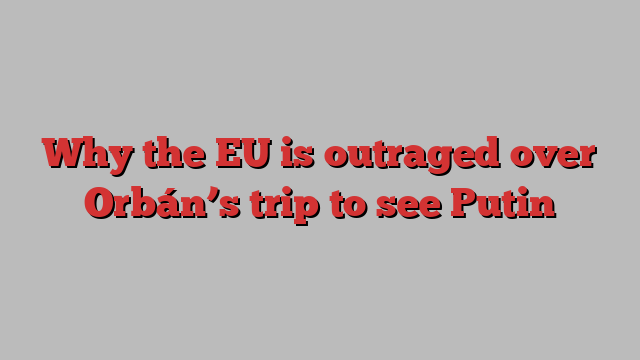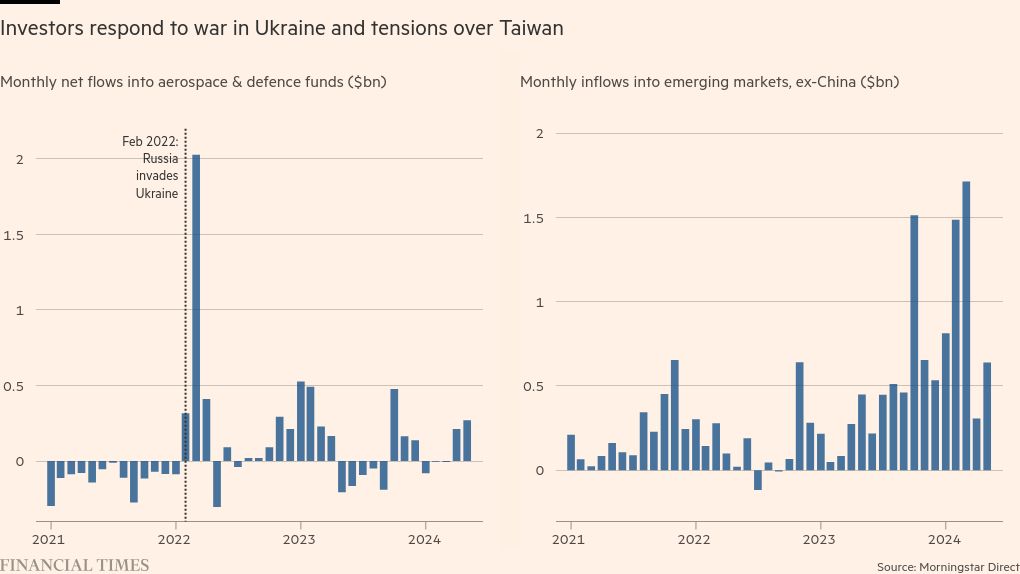
This article is an onsite version of our Europe Express newsletter. Premium subscribers can sign up here to get the newsletter delivered every weekday and Saturday morning. Standard subscribers can upgrade to Premium here, or explore all FT newsletters
Good morning. The Labour party has won a landslide victory in the UK general election. Find all our coverage here.
If you want to know more, sign up to our subscriber election webinar, featuring my UK colleagues George Parker and Lucy Fisher, Inside Politics’s Stephen Bush and columnists Miranda Green and Robert Shrimsley.
Today, our team digest the startling news of Viktor Orbán’s trip to Moscow. And our man in Berlin explains how a dubious hand gesture at a Euro football match has triggered a diplomatic spat between Germany and Turkey.
I’ll be in Washington next week for the Nato summit, leaving you in Laura’s brilliant hands. Have a great weekend.
True colours
Hungarian Premier Viktor Orbán is following his first wartime trip to Kyiv this week with a diametrically opposite turn: a visit to Russian President Vladimir Putin in Moscow, write Alice Hancock and Paola Tamma.
Context: Hungary took over the rotating presidency of the EU on July 1. Orbán is the bloc’s most pro-Kremlin leader, opposes western military aid to Kyiv and has instead called for immediate peace talks between Kyiv and Moscow. Putin is under EU sanctions and subject to an International Criminal Court arrest warrant.
The trip comes just days after his first visit to Ukraine since Russia’s full-scale invasion in February 2022. In Kyiv, Orbán said: “We are at Ukraine’s service during the Hungarian presidency.”
Ukraine’s government didn’t want this “service” with Orbán apparently seeking to leverage his newfound stature by attempting to broker peace between the two warring states. Given Russia occupies large chunks of his country, Ukrainian President Volodymyr Zelenskyy has rejected peace talks up until now.
“The EU rotating presidency has no mandate to engage with Russia on behalf of the EU,” said Charles Michel, EU Council president. “No discussions about Ukraine can take place without Ukraine.”
“There is always going to be a question during this presidency: is Orbán speaking for himself or for the EU,” one EU diplomat observed.
His trip to Moscow will be followed by a visit to Azerbaijan, on another peacekeeping mission: to discuss the contested region of Nagorno-Karabakh.
It also comes as EU countries engage in intense discussions to secure more supplies of Azeri gas amid concerns that the bloc could run short. The last remaining flows of Russian gas through Ukraine are set to stop at the end of this year.
Brussels says that with gas storage levels at record highs for the time of year, member states should be able to survive the next two winters with ease.
But eastern capitals are not as sanguine as the European Commission that the bloc can go without those volumes. “If there is a harsh winter or Asian demand comes back, it could lead to a critical situation,” said another EU diplomat.
Chart du jour: Risk

Investment banks used to hire maths graduates to devise trading strategies. But in these troubling times, they are increasingly leaning on political scientists for guidance.
It’s political
United by Football. United in the heart of Europe. So says Uefa. Turkish President Recep Tayyip Erdoğan feels otherwise.
In the last 24 hours, an offensive on-pitch gesture by a Turkish player at the ongoing Euro championships, hosted by Germany, has escalated into a diplomatic incident between Berlin and Ankara, writes Sam Jones.
Context: Turkey beat Austria 2-1 in a fast-paced knife-edge match on Wednesday, securing a place in the quarterfinals. But after scoring the decisive goal, Turkish player Merih Demiral celebrated with a notorious fascist hand gesture, the “wolf salute”. It is a signal of support for Turkey’s ultranationalist and antisemitic Ülkü Ocakları movement, known as the Grey Wolves.
Demiral brushed it off, saying he merely meant to celebrate his ethnic heritage.
But German authorities — who monitor the Grey Wolves as an extremist organisation — thought otherwise, holding up a diplomatic red card: yesterday they summoned Turkey’s ambassador in Berlin to complain.
That triggered a tit-for-tat response from Ankara, who summoned the German ambassador in return.
Uefa has opened an investigation into Demiral, with some calling for him to be banned from future matches.
The Turkish foreign ministry called the gesture Demiral flashed a “historical and cultural symbol”, accusing Germany’s reaction of being “xenophobic”.
Turkish President Erdoğan even personally got involved. A fervent football supporter, he has been calling the Turkish team personally after every match to congratulate them.
Yesterday afternoon, the Turkish president announced he was cancelling a planned trip to Azerbaijan this weekend — where Turkey plays a critical role in ongoing peace talks with Armenia — in order to fly to Germany as a statement of national defiance.
The president intends to attend Turkey’s next match, against the Dutch, in Berlin tomorrow.
What to watch today
-
Hungarian Prime Minister Viktor Orbán visits Russian President Vladimir Putin in Moscow.
-
Provisional EU tariffs on electric vehicle imports from China come into force.
Now read these
-
Far-right front: France’s Rassemblement National is in talks to join a new group with Hungary’s Viktor Orbán in the European parliament.
-
Polls and goals: Gideon Rachman goes to the Euros, watching new football stars emerge in the shadow of war and a resurgent far right.
-
Pull factor: Portugal’s new right-wing government wants to reintroduce controversial tax breaks to entice foreigners to the country.
Recommended newsletters for you
The State of Britain — Helping you navigate the twists and turns of Britain’s post-Brexit relationship with Europe and beyond. Sign up here
Chris Giles on Central Banks — Your essential guide to money, interest rates, inflation and what central banks are thinking. Sign up here
Are you enjoying Europe Express? Sign up here to have it delivered straight to your inbox every workday at 7am CET and on Saturdays at noon CET. Do tell us what you think, we love to hear from you: [email protected]. Keep up with the latest European stories @FT Europe